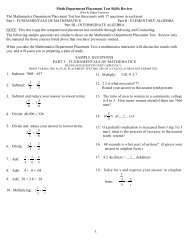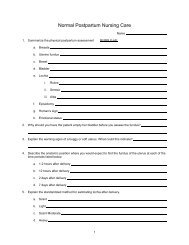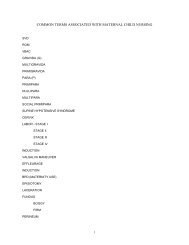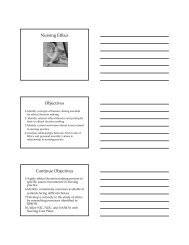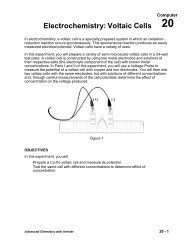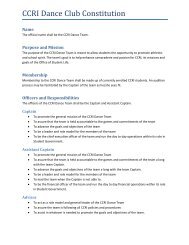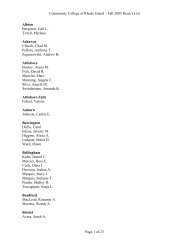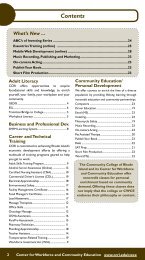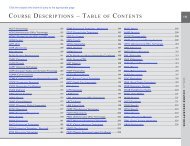Course Descriptions - Community College of Rhode Island
Course Descriptions - Community College of Rhode Island
Course Descriptions - Community College of Rhode Island
You also want an ePaper? Increase the reach of your titles
YUMPU automatically turns print PDFs into web optimized ePapers that Google loves.
UPDATED 5/16/11<br />
COMI 1905 - Desktop Publishing<br />
S<strong>of</strong>tware - 3 Credits<br />
This course focuses on basic page design,<br />
layout and formatting <strong>of</strong> publications for<br />
production <strong>of</strong> a complete camera-ready<br />
newsletter or newspaper. Lecture: 3 hours,<br />
Lab: 1 hour<br />
COMI 1910 - Introduction to Desktop<br />
Publishing S<strong>of</strong>tware - 1 Credit<br />
This course focuses on the graphic editing<br />
and basic page layout utilizing up-to-date<br />
desktop publishing application s<strong>of</strong>tware<br />
and its most basic toolset. Lecture: 3 hours,<br />
Lab: 1 hour<br />
COMI 1920 - Intermediate Desktop<br />
Publishing S<strong>of</strong>tware - 1 Credit<br />
This course focuses on graphic editing,<br />
formatting techniques and page layouts<br />
while using up-to-date desktop publishing<br />
s<strong>of</strong>tware and its more advanced toolset.<br />
(Recommended: COMI 1910) Lecture: 3 hours,<br />
Lab: 1 hour<br />
COMI 1930 - Advanced Desktop<br />
Publishing S<strong>of</strong>tware - 1 Credit<br />
This course focuses on the complete<br />
publication <strong>of</strong> a newspaper/newsletter<br />
integrating forms, digitized graphics and<br />
textual materials with up-to-date application<br />
s<strong>of</strong>tware. Advanced editing techniques<br />
<strong>of</strong> graphic and textual elements will also be<br />
covered using the s<strong>of</strong>tware’s most complex<br />
toolset. (Recommended: COMI 1920) Lecture:<br />
3 hours, Lab: 1 hour<br />
COMI 1971- Introduction to Animation<br />
S<strong>of</strong>tware - 1 Credit<br />
This module introduces students to the<br />
fundamental concepts and skills <strong>of</strong> animation<br />
s<strong>of</strong>tware. Students learn how to draw<br />
basic shapes and work with type and the<br />
pen tool to create objects. Students learn<br />
to animate positions, edit key frames and<br />
animate object properties to create a basic<br />
animation. Lecture: 3 hours, Lab: 1 hour<br />
COMI 1973 - Advanced Animation<br />
S<strong>of</strong>tware - 1 Credit<br />
This module expands students’ knowledge<br />
<strong>of</strong> skills <strong>of</strong> animation s<strong>of</strong>tware. Students<br />
learn to create basic rollovers, animated<br />
and remote rollovers and animated masks.<br />
Students also learn to create basic behaviors,<br />
animate time-independent groups<br />
and add sounds to compositions. Creating<br />
advanced behaviors, combining animations<br />
with QuickTime movies in Web development<br />
s<strong>of</strong>tware and exporting work also<br />
are explored. (Recommend: COMI 1971)<br />
Lecture: 3 hours, Lab: 1 hour<br />
COMI 2010 - Client-Side Scripting<br />
Languages - 3 Credits<br />
This course will introduce scripting languages<br />
and their use in programming for<br />
the World Wide Web with a focus on client-side<br />
scripting. It will include fundamental<br />
programming topics such as memory<br />
concepts, control structures and writing<br />
functions. It will also include an introduction<br />
to both client-side and server-side<br />
scripts. Lecture: 3 hours, Lab: 1 hour<br />
COMI 2012 - Server-Side Scripting<br />
Languages - 3 Credits<br />
This course introduces server-side scripting<br />
using current technologies. It includes<br />
fundamental programming topics such as<br />
control structures, data representation,<br />
object-oriented development techniques<br />
as well as more advanced topics such as<br />
server capabilities and interfacing with<br />
databases to support e-commerce and<br />
customizable user experiences on the Web.<br />
Lecture: 3 hours, Lab 3 hours<br />
COMI 2015 - Introduction to Micros<strong>of</strong>t<br />
Project - 1 Credit<br />
This module introduces students to project<br />
management s<strong>of</strong>tware, an essential tool<br />
used by most information technology environments.<br />
Upon completion <strong>of</strong> this course,<br />
students are able to create and analyze<br />
projects using Micros<strong>of</strong>t Project Manager.<br />
Lecture: 3 hours, Lab: 1 hour<br />
COMI 2020 - Network Security<br />
S<strong>of</strong>tware Fundamentals - 3 Credits<br />
This course introduces students to networking<br />
security, a critical knowledge point<br />
for technology pr<strong>of</strong>essionals. This course<br />
provides students with introductory concepts<br />
and technical skills needed to create<br />
and maintain a secure network environment.<br />
Lecture: 3 hours, Lab: 1 hour<br />
COMI 2031 - Computer Support:<br />
Concepts - 3 Credits<br />
Due to high demand for specialists, this<br />
course introduces students to basic technical<br />
concepts, functions and support systems.<br />
Lecture: 2 hours, Lab: 2 hours<br />
COMI 2032 - Computer Support:<br />
End User - 3 Credits<br />
As the user-base <strong>of</strong> technology continues<br />
to grow, this course teaches students about<br />
the different tools available for internal vs.<br />
external users, reviews the recommended<br />
set <strong>of</strong> “s<strong>of</strong>t skills” and identifies the many<br />
different skill levels <strong>of</strong> the computer user.<br />
Lecture: 2 hours, Lab: 2 hours<br />
COMI 2033 - Computer Support: Tools<br />
and Techniques - 3 Credits<br />
This course focuses on s<strong>of</strong>tware support<br />
tools and how to determine which tools<br />
are best suited for particular environments<br />
as well as methods to assess the success<br />
and effectiveness <strong>of</strong> these tools. Lecture: 2<br />
hours, Lab: 2 hours<br />
COMI 2035 - Introduction to Computer<br />
Forensics - 3 Credits<br />
This course starts with the basics <strong>of</strong> computer<br />
technology to build a foundation<br />
for understanding where evidence can be<br />
found. It introduces students to the technology<br />
and procedures <strong>of</strong> acquiring and<br />
analyzing digital evidence taken from computers.<br />
This course also exposes students<br />
to the s<strong>of</strong>tware being used in the industry.<br />
Lecture: 2 hours, Lab: 2 hours<br />
Prerequisite: Successful completion <strong>of</strong> course required before registering. Corequisite: <strong>Course</strong> must be taken prior to or at the same time.<br />
computer studies<br />
COMI 2036 - Introduction to Computer<br />
Ethics - 3 Credits<br />
This course explores the ethical impact <strong>of</strong><br />
computer technology on the world, as well<br />
as the rules and regulations that ensure the<br />
proper use <strong>of</strong> technology. Internet crime,<br />
privacy protection and first amendment<br />
rights that protect our freedoms in cyberspace<br />
are closely examined. (Recommended:<br />
Take in final semester) Lecture: 3 hours, Lab:<br />
2 hours<br />
COMI 2040 - Beginning Game<br />
Programming - 3 Credits<br />
This course will introduce the student to<br />
game development and the beginning principles<br />
<strong>of</strong> game programming. (Recommended:<br />
COMI 1150) Lecture: 2 hours, Lab: 2 hours<br />
COMI 2050 - Social Networking<br />
Systems - 3 Credits<br />
This course will introduce the concepts <strong>of</strong><br />
social networking systems. It will define the<br />
advantages and disadvantages <strong>of</strong> current<br />
applications and explore tools, techniques<br />
and platforms that support the s<strong>of</strong>tware<br />
from desktop computers to mobile devices.<br />
The students will learn the fundamentals <strong>of</strong><br />
using social networking applications and<br />
become familiar with Web 2.0 technologies<br />
such as blogs, podcasts, wikis and forums.<br />
The variety <strong>of</strong> categories <strong>of</strong> these systems<br />
will be discussed and students will be able<br />
to apply these basic tools and techniques.<br />
Lecture: 2 hours, Lab: 1 hour<br />
COMI 2510 Advanced Programming<br />
and Design – 3 Credits<br />
This course introduces students to advanced<br />
topics in programming and s<strong>of</strong>tware design<br />
such as graphical modeling techniques and<br />
algorithms and analysis as well as current<br />
techniques in interface design and user<br />
interaction. Specific topics reflect current<br />
technologies and might include inheritance<br />
and polymorphism in object-oriented design<br />
and graphical user interfaces and the event<br />
loop. (Prerequisite: COMI 1510 recommended<br />
but not required) Lecture: 3 hours Lab: 1 hour<br />
157



